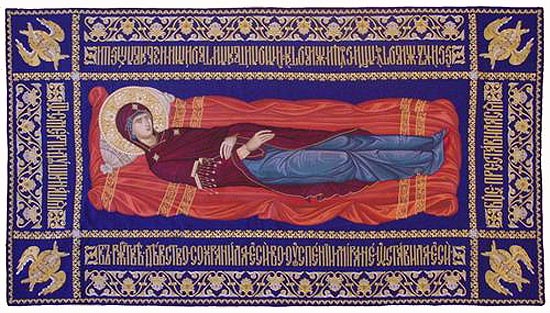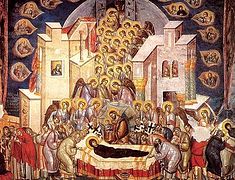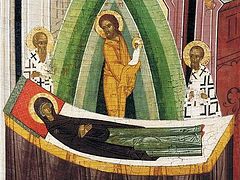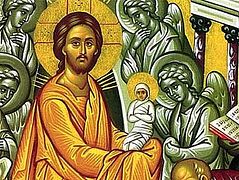In the Name of the Father, the Son, and the Holy Spirit.
 Epitaphion (burial shroud) of the Mother of God.
Epitaphion (burial shroud) of the Mother of God. Today we celebrate the day of the Dormition, the repose of the Most Holy Virgin Mother of God. This is our patronal feast, but it is also the patronal feast of the whole Russian Church from ancient times.
How can we celebrate the Dormition? As a day of death? Only if we remember two things: First, that for us who remain on earth, death is the bitter, painful separation from our loved ones. But for the one who dies, death, dormition (falling asleep) is a triumphant, magnificent meeting of a living soul with the living God. Throughout the course of our lives we are hastening towards the fullness of life that the Lord promised us. Whether we know it or not, we can only find this fullness in God. Those who know this—the saints, those who truly believe, and those who waver—as well as those who do not know this, and even those who denied this all their lives, will on the day that their soul departs from the body appear before the living God, Who is life, joy and beauty. And as Fr. Alexander Elchaninov wrote, there is no soul that, having seen divine beauty enwrapped in divine love and the light of eternal life, will not bow down to His feet and say, “Lord! I have sought Thee alone throughout my life…”
On all paths of both righteousness and unrighteousness, man seeks for this fullness, this unspeakable beauty, this meaning, and this all-conquering, all-purifying, all transforming love. Therefore, when we ourselves are faced with the death of a loved one, no matter how deep our grief may be, no matter how torn apart our soul may be, we must learn to cross ourselves, place ourselves under and before the Cross of the Lord, and say: Yeah, Lord! I am afflicted with perhaps the greatest grief that could happen to me, but I rejoice that the living soul of a person I love has been made worthy today to stand before Thy glory and partake of the fullness of life in transfigured glory…
We are not speaking in vain about how dormition, as the apostle Paul reminds us so many times, is the temporary sleep of our flesh until the day of its resurrection. And so, celebrating the Dormition of the Mother of God, we not only believe that she will be resurrected on the last day, as will we all, but we also know for sure from apostolic tradition, from the experience of the Church—not only of saints but also of sinners, whom the Mother of God has sought with her love, mercy, and compassion—that she has already been resurrected in the flesh as well, and entered into the life that will be revealed to us at the end of time. Therefore we can celebrate today with full joy the Dormition of the Mother of God, when the chains of the body fell from her, when she was freed from the bounds of created existence, when she departed from the narrow confines of this fallen world, and in full glory, in her full unspeakable beauty, in her full purity stood before the face of Her Son and God, before the face of God the Father.
Our joy can be made perfect without tears, without grief, for this is the triumph of life. But it is also a testimony that the resurrection is not an empty word, not an allegory, but that we all, as God promised, will be resurrected and enter into the fullness of our humanity—both in soul and in spirit, in flesh and in eternity, into the eternal joy of our Lord.
Therefore let us rejoice and be glad on this day!
How wondrous it is that the Russian Church, as far back as the eleventh century, beheld this mystery, received this mystery of the Mother of God, the mystery of life, and death, and resurrection, and the final triumph, which made this feast the feast of the Russian Church. Amen.



